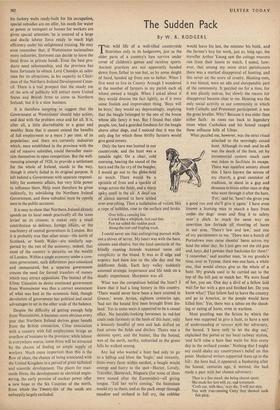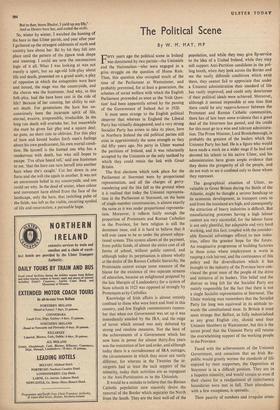The Sudden Pack
By W. R. RODGERS .HE wild life of a well-tilled countryside flourishes flourishes only in its hedgerows, just as the older parts of a country's lore survive under cover of children's games and carefree sports. Ancient practices are not apparently handed down from father to son but, as by some sleight of hand, handed up from son to father. When I first went to live in County Armagh I wondered at the number of farmers in my parish each o4 whom owned a beagle. When I asked about it they would dismiss the fact lightly, as if it were some foolish and improvident thing. 'Boys will be boys,' they would say deprecatingly, implying that the beagle belonged to the son of the house whose idle fancy it was. But I found that older people, too, had a guarded fondness for the beagle above other dogs, and I noticed that it was the only dog for which these thrifty farmers would give good money.
Only the hare was hunted in our countryside, and the hunt was a notable sight. On a clear, cold morning, hearing the sound of the horn and the far cry of the beagles, I would go out to the glebe-field to watch. There would be a sprinkle of frost and a sparkle of Over hills a running line Curled like a whiplash, fast and fine, Past me sailed the sudden pack Along the taut and tingling track.
I could never see that unforgiving pursuit with- out a shiver of terror. My heart was with the hare, sinuous and elusive, but the loud spectacle of the blindly running. hounds wakened some old complicity in the blood. It was as if edge and urgency had been lent to the idle day and the indifferent fields. Each lazy valley suddenly assumed strategic importance and life took on a deadly importance. Sharpness was all. • .
What was the compulsion behind the hunt? I knew that it had a long history in this country. `There would never have been a hare coursed in Greece,' wrote Arrian, eighteen centuries ago, `had not the hound first been brought from Ire- land.' Yet in some ways it appeared to be a casual affair. No heraldic-looking horsemen in red-hot coats rode furiously at the heels of this hunt; only a leisurely handful of men and lads drifted on foot across the fields and ditches. Theirs was a demotic sport, and the hunter, like the hound, was of the earth, earthy, unhurried as the green hills he walked among.
Any lad who wanted a hunt had only to go to a hilltop and blow the `bugle,' and instantly, from every farm within earshot, a beagle would emerge and hurry to the spot—Hector, Lovely, Traveller, Shamrock, Megaera (for some of them were named after the Eumenides)—all giving tongue. 'Tell her we're coming,' the huntsman would cry to them; and as the pack swept through meadow and orchard in full cry, the cobbler would leave his last, the minister his book, and the farmer's boy his work, just as, long ago, the traveller Arthur Young saw the cottage weavers run from their looms to watch. I noted, how- ever, that among my more strict parishioners there was a marked disapproval of hunting, and this never on the score of cruelty. Hunting-men, it was hinted, were an idle and disreputable part of the community. It puzzled me for a time, for it was plainly untrue, but slowly the reason for disapproval became clear to me. Hunting was the only social activity in our community in which both Catholic and Protestant participated; it was the great leveller. Why? Because it was older than either faith : its roots ran back to legendary times when Cuchulain and his hound ranged these selfsame hills of Ulster.
What puzzled me, however, was the strict ritual attached to the seemingly casual hunt. Although its end- and be-all was the death of the hare, yet by immemorial custom much care was taken to facilitate its escape. There was manifest anxiety about this. I have known the sexton of my church, a great caretaker of tradition, to stand in a gap and threaten to brain either man or dog who went through it after the hare. `For,' said he, 'hasn't she given you a good run and she'll give it again.' I have even known a hunting man to snatch a hare from under the dogs' noses and fling it to safety over a ditch. In much the same way an unwritten law forbade all shooting of hares in our area. 'There's law and law,' said one of my parishioners to me. `There was a bunch of Portadown men came shootin' hares across my land the other day. So I just gets out the old gun and, boys, did 1 powder their backsides for them 1' `I remember,' said another man, `in my granda's time, over in Tyrone, there was one hare, a white one, that would always give us the whale of a hunt. My granda used to be carried out to the top of the hill just to watch her. We were fond of her, you see. One day a divil of a fellow laid wait for her with a gun and finished her. Do you know what? That fellow had to leave the country and go to America, or the people would have killed him.' Yes, there was a taboo on the shoot- ing or eating of hares, even in wartime.
Most puzzling was the fiction by which the hare was supposed to give a hunt, to have a sort of understanding or tutoyer with her adversary, the hound. 'I have only to let the dog out,' explained the porter at my local railway station, `and he'll raise a hare that waits for him every day in the orchard yonder.' Nothing that I might say could shake my countrymen's belief on this point. Medieval writers supported them up to the hilt : the hare had, it appeared, a hankering after the hound; centuries ago, it seemed, she had made a pact with, her chosen adversary :
Then in a fine mead, she being almost spent, She made her last will, ay, aid testament. `Croft cur, with thee,' says she, 'I will not stay, Nor with true-running Cutty that showed such fair play, But to thee, brave Hector, I yield up my life,' And so Hector bore her, and ended the strife.
So, winter by winter, I watched the hunting of the hare in that Ulster parish, and year after year I gathered up the strangest oddments of myth and country lore about her. Bit by bit they fell into place until the pattern of the jigsaw took shape and meaning. I could see now the unconscious logic of it all. What I was looking at was not merely a sport,. but an age-old folk-play about life 'and death, presented on a grand scale; a play of opposites in which the antagonists were hare and hound, the stage was the countryside, and the chorus was the huntsmen. And why, in this folk-play, had the hare been cast in the role of life? Because of her cunning, her ability to out- wit death. For generations the hare has un- consciously been the incarnate spirit of life, eternal, evasive, irrepressible, irreducible. In the long run death will overtake her, but meanwhile she must be given fair play and a square deal; no guns, no short cuts to oblivion. For this play of hare and hound bodies forth man's feelings about his own predicament, his own mortal condi- tion. He himself is the hunted one who has a rendezvous with death, but who still hopes to escape. 'I've often heard tell,' said one huntsman to me, 'that the hare can turn herself into another hare when she's caught.' Cut her down in one form and she will rise again in another. It was.not an uncommon belief in my countryside, and one could see why. In the dead of winter, when colour and movement have ebbed from the face of the landscape, only the hare, that twitching pulse of the fields, was left as the visible, recurring symbol of life and resurrection, a pursuable hope.











































 Previous page
Previous page